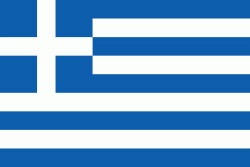Merbaka (Ayía Triás)
Merbaka ((το) Μέρμπακα (n.) or (ο) Μέρμπακας (m.)) is a village and local community of the municipal unit of Midea, in the deme (municipality) of Nafplio, in the periphery of Argolis, in the Peloponnese region.
Merbaka is the village's traditional name, but officially it is called Agia Trias (Αγία Τριάς) in Katharevousa, or Αγία Τριάδα in Demotic). The village was officially renamed on December 29, 1953, in keeping with a broader program of Hellenization of geographical names in Greece.
Merbaka is thought to have been named for William of Moerbeke, a 13th-century Roman Catholic archbishop of Corinth, scholar and Philhellene from Flanders. A roughly contemporaneous Byzantine-Gothic Church of the Dormition of the Mother of God (Ναός της Κοίμησις Θεοτόκου, popularly known as Παναγία της Βούζης, Panagia tis Bouzis, "Our Lady of Bouzis") in the village may have been built under his auspices. The church's popular name is held to have come from a prominent Lemnian family of landowners who donated the land for a mediaeval monastery nearby; their name and social position is attested by contemporaneous documents with the seal of Michael VII Doukas. The monastery was sited further inland from its existing twin, the Monastery of Areias near Nafplio – popularly known as "The Holy Mountain" — to protect the monks and ecclesiastical property from piratical raiding.
Merbaka's official name likely stems from the inclusion of three "saints" on a re-used Classical pediment on the thirteenth-century church: villagers likely interpreted these figures as a representation of the Holy Trinity, and unofficially renamed the church to reflect this; in time, the name was applied to the new church, and later, to the village itself. The older church includes other recycled antiquities like a Roman dedication, in Latin, to Quintus Caecilius Metellus Creticus, a Roman proconsul in Greece who was noted for his suppression of piracy.
Merbaka is the village's traditional name, but officially it is called Agia Trias (Αγία Τριάς) in Katharevousa, or Αγία Τριάδα in Demotic). The village was officially renamed on December 29, 1953, in keeping with a broader program of Hellenization of geographical names in Greece.
Merbaka is thought to have been named for William of Moerbeke, a 13th-century Roman Catholic archbishop of Corinth, scholar and Philhellene from Flanders. A roughly contemporaneous Byzantine-Gothic Church of the Dormition of the Mother of God (Ναός της Κοίμησις Θεοτόκου, popularly known as Παναγία της Βούζης, Panagia tis Bouzis, "Our Lady of Bouzis") in the village may have been built under his auspices. The church's popular name is held to have come from a prominent Lemnian family of landowners who donated the land for a mediaeval monastery nearby; their name and social position is attested by contemporaneous documents with the seal of Michael VII Doukas. The monastery was sited further inland from its existing twin, the Monastery of Areias near Nafplio – popularly known as "The Holy Mountain" — to protect the monks and ecclesiastical property from piratical raiding.
Merbaka's official name likely stems from the inclusion of three "saints" on a re-used Classical pediment on the thirteenth-century church: villagers likely interpreted these figures as a representation of the Holy Trinity, and unofficially renamed the church to reflect this; in time, the name was applied to the new church, and later, to the village itself. The older church includes other recycled antiquities like a Roman dedication, in Latin, to Quintus Caecilius Metellus Creticus, a Roman proconsul in Greece who was noted for his suppression of piracy.
Map - Merbaka (Ayía Triás)
Map
Country - Greece
 |
 |
| Flag of Greece | |
Greece is considered the cradle of Western civilization, being the birthplace of democracy, Western philosophy, Western literature, historiography, political science, major scientific and mathematical principles, theatre and the Olympic Games. From the eighth century BC, the Greeks were organised into various independent city-states, known as poleis (singular polis), which spanned the Mediterranean and the Black Sea. Philip II of Macedon united most of present-day Greece in the fourth century BC, with his son Alexander the Great rapidly conquering much of the ancient world, from the eastern Mediterranean to the North Western parts of India. The subsequent Hellenistic period saw the height of Greek culture and influence in antiquity. Greece was annexed by Rome in the second century BC, becoming an integral part of the Roman Empire and its continuation, the Byzantine Empire, which was culturally and linguistically predominantly Greek.
Currency / Language
| ISO | Currency | Symbol | Significant figures |
|---|---|---|---|
| EUR | Euro | € | 2 |
| ISO | Language |
|---|---|
| EN | English language |
| FR | French language |
| EL | Greek language |















